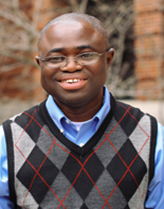event
Picomole-Scale Online Mass Spectrometry Reaction Screening: Photochemistry versus Electrochemistry
Primary tabs
This seminar is sponsored by the Analytical Division of the School of Chemistry and Biochemistry.
Abstract
We recently showed that the coupling of portable laser source with nano-electrospray ionization mass spectrometry enables a real-time photoreaction screening by which visible light-mediated dehydrogenation of N-heterocycles can be achieved in an accelerated manner using only pico-moles of photo-catalysts. For tetrahydroisoquinoline (THiQ), however, DFT calculations revealed a high-speed electronic interconversion bottleneck and predicted the use of N-substitution to alleviate this electronic effect.
Detailed experiments have confirmed that the atmospheric pressure droplet-based reaction platform can reproduce theoretical calculations, results of which are easily transferred into bulk-phase synthesis using sun energy. Similar experiments will be presented that involve facile electroorganic reactions
Research Overview
The Badu Research Group currently has three main research foci:
(i) diagnostic mass spectrometry (MS) - in this project we focus on the development of new MS tools for non-experts (e.g., surgeon, immunologist, neuroscientist, etc.), and to make MS data acquisition and interpretation easier for them. We are developing new chemical probes that enable mass spectrometric analysis of proteins, antibodies, DNA, and other disease biomarkers under ambient conditions.
(ii) Accelerated droplet reactions - here, we focus on the development of new tools to study organic/bio-molecular reactions using droplets as reaction vessels. We are interested in green catalysis, new reaction pathways, and the mechanism governing reactions in the micro-droplet environment.
(iii) Aerosol therapy - in which we use MS as a tool to characterize drug aerosols, and to improve on their efficacy. All students that study in the Badu research group become exposed to the fundamentals of ambient ion chemistry (in a droplet or at an interface), modern MS instrumentation, bio-molecule handling, and bio-assay/immunoassay development.
Biography
Abraham Badu-Tawiah obtained his B.Sc. (2002) and M.Sc. (2005) degrees from Kwame Nkrumah University of Science and Technology, Kumasi – Ghana, and M.S. (2007) degree in Chemistry from Indiana University of Pennsylvania, Indiana PA.
He received Ph.D. (2012) in Chemistry from Purdue University (under the supervision of R. Graham Cooks), where he was awarded Andrews (2007 – 2009), Bisland Dissertation (2011), and Lilly Innovative (2012) Fellowships. From 2012 to 2014, he was a postdoctoral fellow at Harvard University under the direction of George M. Whitesides.
He joined The Ohio State University, Department of Chemistry and Biochemistry in July 2014.
Contact Information:
Host: Prof. Facundo Fernandez (facundo.fernandez@chemistry.gatech.edu)
Groups
Status
- Workflow Status:Published
- Created By:A. Maureen Rouhi
- Created:10/06/2017
- Modified By:A. Maureen Rouhi
- Modified:10/06/2017
Categories
Keywords
Target Audience

